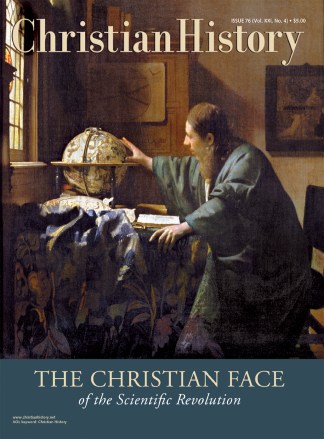In 1615, a Carmelite monk from Naples published a tract defending the Copernican system. In his reply, Rome’s leading theologian, Cardinal Roberto Bellarmine, congratulated the monk for speaking hypothetically.
Yes, a heliocentric scheme “saved all the appearances” better than Ptolemy’s epicycles—the small circular movements he had posited to account for the complicated wanderings of the planets against the background of the stars. But to affirm that “the sun is really fixed in the center of the heavens, and that the earth revolves very swiftly around the sun” was theologically suspect, as it seemed to contradict Scripture.
Bellarmine did admit, “if there were a true demonstration, then it would be necessary to be very careful in explaining Scriptures that seemed contrary,” but he had certainly never seen any such demonstration—and did not think that one existed.
What kind of proof would have persuaded Bellarmine that the earth actually, not just hypothetically, revolved around the sun?
Copernicus had offered no physical proof, though his system did provide rational explanations of certain otherwise arbitrary aspects of planetary motions. When in 1610 Galileo with his newly improved telescope discovered the phases of Venus, he demonstrated that Venus had to go around the sun. But while his observation proved Ptolemy wrong, it did not necessarily prove Copernicus right.
As Bellarmine implied, just because assuming the sun is in the center of the universe with Venus going around it neatly explains the observed phases, this does not in fact demonstrate that the sun is actually in the center of the universe. Instead, the earth could be in the center of the universe, with, around it, the orbiting sun, which in turn could carry Venus and the other planets in orbit around it, just as the astronomer Tycho Brahe had proposed. For Bellarmine, the earth was still the glorious fixed pivot of all creation.
Galileo desperately wanted to find a proof that could persuade Bellarmine, but he died harassed by the Inquisition because he could not.
Today nearly every introductory astronomy text gives proofs of both the rotation of the earth on its axis (the so-called Foucault pendulum experiment) and its annual revolution around the sun (parallax, or the change in the apparent position of stars when the earth is at various points in its orbit). Would the Foucault pendulum and parallax have convinced Bellarmine in 1615? Probably not. He could easily have imagined that the daily whirling of the heavens around the earth in some way dragged the swing of the pendulum around with it. And the stars could each have a little epicyclet to provide their subtle and hard-to-detect annual motions. Then the literal meaning of Psalm 93 could be preserved: “The Lord God laid the foundation of the earth that it not be moved forever.”
Why, then, are these proofs so convincing today, when they were unpersuasive in 1615? Today, Newton’s system of natural laws is part of our heritage. It gives a coherent physical description of motions both celestial and terrestrial, and physical explanations of many previously unexplained phenomena. The Foucault pendulum and parallax mesh perfectly in this system. So science marches on more by persuasion than by proof—and Galileo’s efforts at persuasion, though thwarted in his lifetime, helped make it so.
—Owen Gingerich
Copyright © 2002 by the author or Christianity Today/Christian History magazine. Click here for reprint information on Christian History.










